So you've decided you're ready to take your marketing to the next level by investing in a marketing automation tool — congrats!

But as you start your research, you soon discover there are 7,000+ marketing automation solutions available as of 2019. How will you know which is the right platform for your ecommerce business?
Like with every tricky business question, the answer is: it depends.
In this post, I'll cover seven factors to consider when comparing different marketing automation platforms. These factors will ultimately help you make a more confident and informed decision about the future of your tech stack.
But first, let's discuss why ecommerce businesses should always use some kind of marketing automation platform.
Why Use Marketing Automation for Ecommerce?
Marketing automation uses online software to automatically execute your marketing tasks, like sending emails, growing your database, and collecting data to help drive your strategy. Although it's commonly known for making the lives of digital marketers easier (which I can completely attest to), it also helps your ecommerce business scale.
At Campaign Creators, we help ecommerce brands leverage the power of marketing automation. Here's a list of some of the immediate benefits we've seen our clients reap after implementation:
- Reduced customer acquisition costs
- Increased average order value (AOV) of customers
- Conversion of one-time buyers into repeat, loyal customers
- Increased frequency of purchases
- Improved conversion rates with automated emails (i.e. abandoned cart emails)
Ecommerce Marketing Automation Platforms to Consider
With thousands of marketing automation solutions available, it can be difficult to choose the right one for your company. Because the buyers journey and sales cycle differ between ecommerce and other types of businesses, some platforms may lack the tools and features you need to manage the customer lifecycle.
Start your research by examining marketing automation tools that have a specific solution for ecommerce businesses, including:
Then, use the following seven factors to guide your evaluation process and help you make the best purchase decision.
7 Factors to Consider When Choosing the Right Marketing Automation System
1. User Interface
First, consider how simple or overwhelming the platform's user interface is designed. Many, if not all, platforms will claim they have an intuitive and easy-to-use platform — but this isn't always the case.
To determine whether the platform's user interface will be easy for you to learn, ask for a demo of the platform. When testing each platform, ask yourself:
- Is there clear navigation? Try creating an email or accessing the analytics, and see if these simple tasks are difficult to complete.
- Is there contextual information? If titles are vague or confusing, some platforms will provide contextual information below or when you hover over the title.
- Did you have to jump through multiple hoops to complete a simple task? If so, this can hinder your efficiency in the long run.
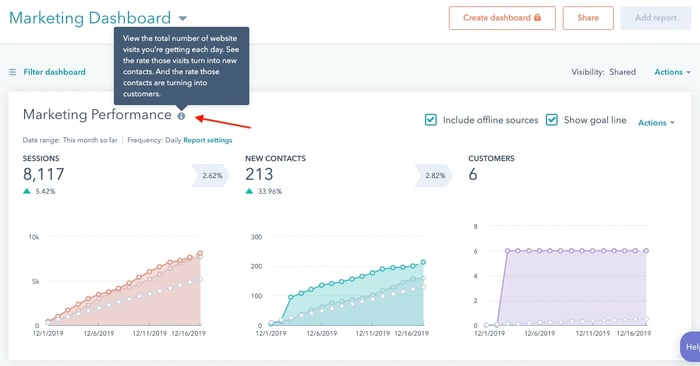
A learning curve often exists when jumping onto a new platform. As an ecommerce business, you'll likely have other priorities such as fulfilling online orders or launching other campaigns. So, make sure you're able to test the user interface of the platform to determine how quickly you'll be able to get up to speed — and get to work.
2. Features & Native Integrations
Each marketing automation platform will offer different features, so make sure you're choosing a platform that has the capabilities you need. Also, consider the existing technology you already have. You may have existing technology you want to integrate with your new platform.
When comparing platforms, ask yourself:
- Does the platform have the features you need? Making a list of features you need prior to doing research can help you stay focused on choosing the right platform.
- Does the system natively integrate with your existing technologies? This will make it easier to connect and transfer data across your existing platforms.
- Does the system have an open API? This can be essential to consider if you plan to have a developer create custom assets.
As an ecommerce company, you may have your online shop on a different platform, such as Shopify. If this is the case, it's essential to make sure your shop natively integrates with your new marketing automation platform. This will make it easier to set up your automated lead nurturing campaigns that are based on your contact's website activity.
3. Customer Support
When jumping on a new and unfamiliar system, you'll want to receive the best help possible. It's important to recognize that technology isn't perfect and that things may break — so having that extra help to resolve your unique issue can be critical.
When purchasing a new marketing automation platform, some kind of technical support is usually provided, however, the type of support available can differ.
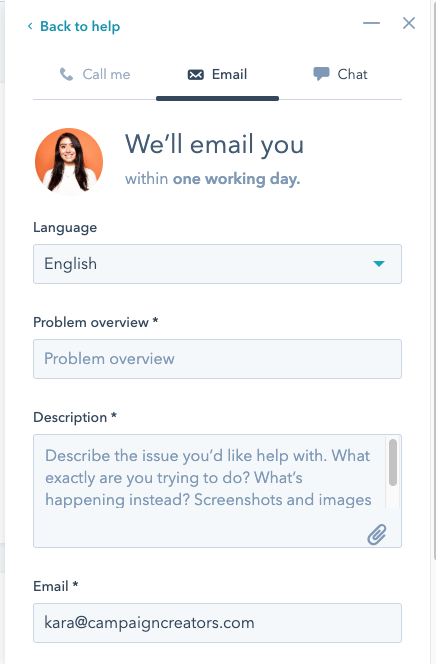
Ask yourself:
- What kind of customer support is available? The most common is provided through phone support, email, or live chat. Being able to connect with an actual human (rather than a chatbot) can help you resolve unique issues.
- How immediate can you receive an answer? Sometimes support is available 24/7, and sometimes you may have to wait 24 hours.
- If customer support is not available, are there other resources you can utilize? It's possible customer support isn't an option, that it may require an extra fee you can't afford, or just isn't available 24/7. For those cases, community forums or online documentation can fill those gaps.
Especially if you don't have the time or extra help to figure out an issue, customer support can be an essential factor to prioritize when comparing different marketing automation platforms.
4. Learning Resources
When purchasing a new marketing automation tool, having online resources available can help you get the most out of your new system. Some platforms have guides, how-to videos, or even webinars that can help you learn how to use the tool.
For instance, the HubSpot Academy is a great online learning resource. Within the Academy, you'll find all kinds of how-to videos that teach you how to become an advanced HubSpot user.
When choosing a platform and researching their learning resources, ask yourself:
- What will these resources teach you? Some may be quick video walk-throughs of how to get started with the platform, or some may have comprehensive learning modules that provide certifications.
- How can you access these resources? Most are free and easily accessible online, but this may not always be the case.
- Are these resources up-to-date? You want to make sure your resources are relevant to the marketing automation platform you're purchasing at the time.
5. Userbase & Reviews
Although choosing the right platform for your ecommerce business really depends on your company's personal needs and goals, you'll want to understand how other users of the tool are making the most of it.
Look for case studies or video testimonials that have existing customers speaking about their experience with the tool. To get a more authentic review of the platform, use outside review sites such as G2's Marketing Automation Software Comparison. G2 is a trustworthy source that encourages peer reviews and star ratings of business products. Check out their grid below, which ranks the top marketing automation software products.
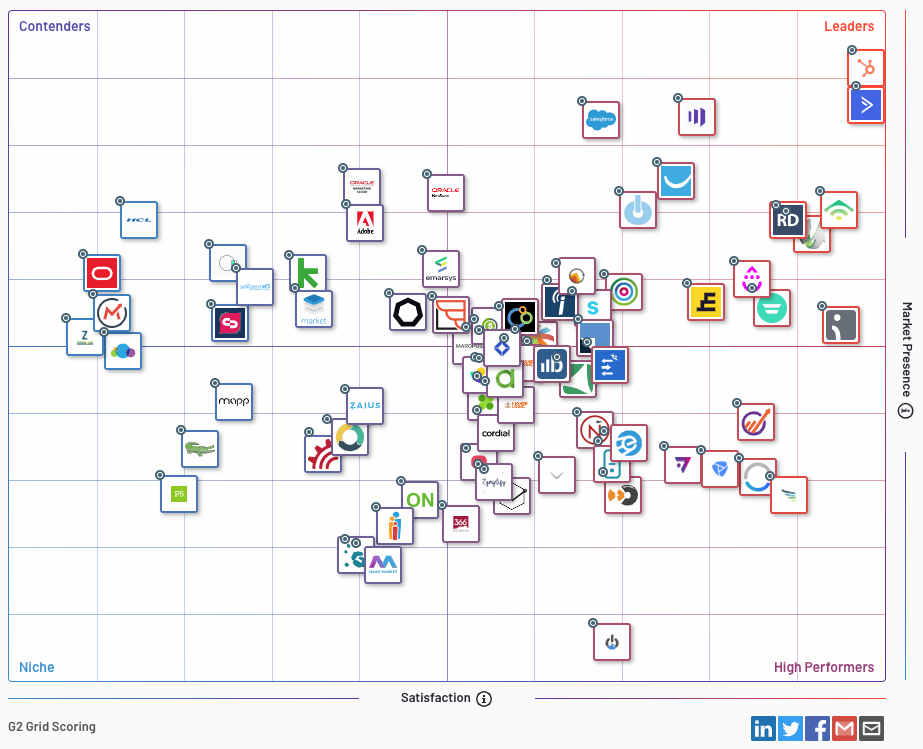
When researching each platform, ask yourself:
- How many users and companies are on this platform? The size of the system's userbase can indicate its popularity.
- Is the platform used mostly by B2B or B2C/Ecommerce companies? Some platforms are clearly for B2B companies and may lack essential ecommerce features.
- What are others saying about the platform? Reading reviews from an outside source can provide a more authentic view.
6. Pricing
Pricing structures can differ from platform to platform, but most will have a certain price per number of contacts. When researching pricing for different platforms, ask yourself:
- What is the base price of the platform and how many contacts can you have? Because ecommerce companies tend to have larger databases, make sure you're aware of how much you may pay.
- How quickly could your contact database scale? Use past data to see how fast your database has grown. This can give you insight into how much you might need to pay in the future.
- What features or benefits impact the pricing? You may be able to get a cheaper price or cheaper version of the platform if you don't need certain features.
As a rule of thumb, the simpler and more transparent a company is about their pricing structure — the better. Jumping on a call with a sales rep can also be an easier way to figure out exactly what the price will be based on the size of your database, the features you need, and the goals you've set for your company.
7. Set-up & Onboarding
Once you've purchased your new marketing automation platform, there's no doubt you'll need some kind of assistance getting up and running. However, the assistance offered varies between platforms.
When researching about a platform's set-up and onboarding process, ask yourself:
- Is there a set-up and onboarding fee, and if so, how much is it? Some platforms charge a fee that can range from hundreds to thousands of dollars just to get set-up.
- Does the process happen remotely, or will someone be physically there to guide you?
- Are you migrating from one system to another? If so, extra support may be necessary to ensure all contact data is transferred over correctly.
Ultimately, ecommerce companies tend to have larger databases that scale quickly, so make sure you're considering a platform that will benefit you in the future, as well.
To make life easier for you, take a look at Campaign Creators' Marketing Automation Comparison Guide. While research can be tedious, this chart will make it easier for you to digest and compare multiple platforms at once. The more you know prior to choosing a platform, the easier it will be to choose the right marketing automation system for your company's needs.

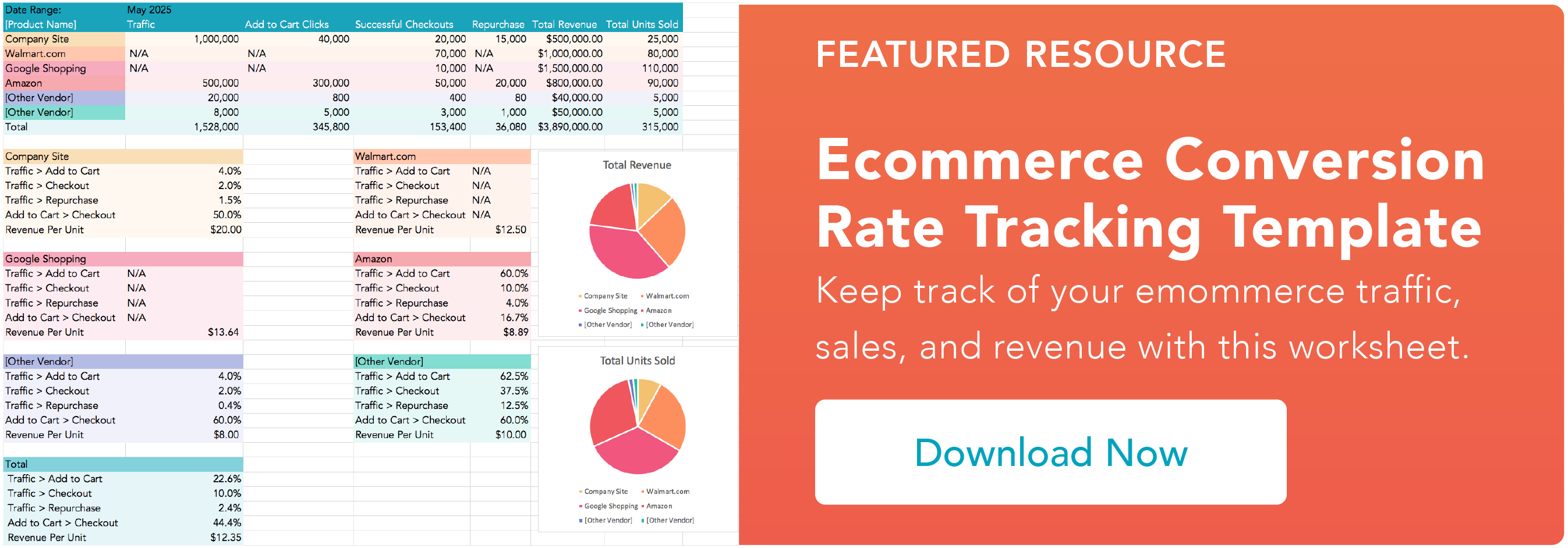
![How to Write an Ecommerce Business Plan [Examples & Template]](https://blog.hubspot.com/hubfs/ecommerce%20business%20plan.png)


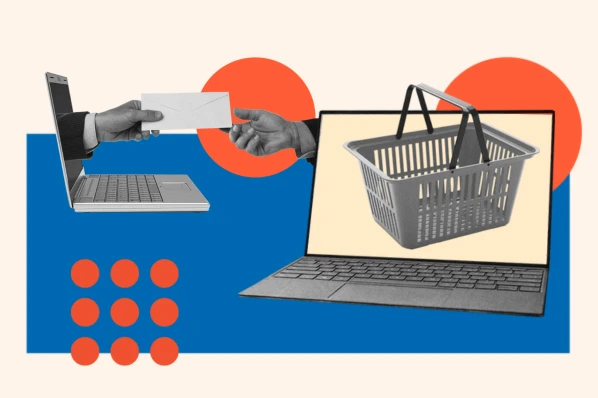
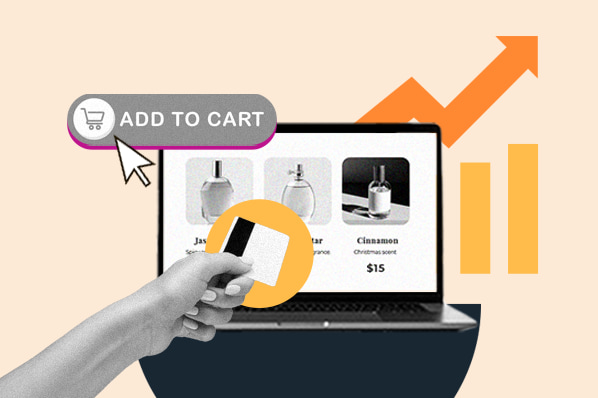
![How to Send Effective Order Confirmation Emails [Examples + Template]](https://blog.hubspot.com/hubfs/order-confirmation-email-1.jpg)

![How to Start an Ecommerce Business in 2022 [Steps + Must-Follow Tips]](https://blog.hubspot.com/hubfs/how%20to%20start%20an%20ecommerce%20business.jpg)
